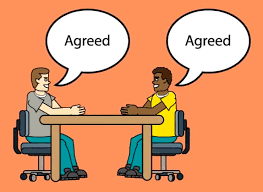 |
The Basics of Principled Negotiation |
Preamble - The ability to negotiate with people and strike deals or reach favourable agreements is considered by some to be a specialist skill in certain professions like diplomacy, sales, legal practice and stock-broking. But the reality is we engage in negotiations of all kinds almost on a daily basis which makes negotiation skills a necessity regardless of your profession or career stage. Depending on the nature of your job, you may find yourself negotiating with clients, colleagues, suppliers, competitors and distributors within the same week. It is therefore necessary for professionals to understand the underlying principles of effective negotiation and apply the right knowledge, skills and attitude when bargaining on any issue. Your ability to negotiate can determine what you earn in terms of salary or even profits. Your ability to get the best deals from suppliers, agents and distributors has a huge impact on the bottom-line of your organization. Your negotiation skills can enable you move to the board level and take active part in strategic decisions affecting the entire organization.
What Type of Negotiator Are You?
This is a question many people may not have consciously thought about and so cannot produce an immediate answer for. It is pertinent that you understand your negotiation style and make any necessary adjustments. Also, there is a clear distinction between types of negotiations and the types of negotiators. The former relates to the kind of end result advocated by one or more of the parties in the negotiation process while the latter relates to the style or approach adopted by a particular negotiator. There are two main types of negotiation which are:
Distributive negotiation - a negotiation process with an intended win-lose outcome where one parties gains at the expense of the other. By implication, either or both parties are pushing for a zero sum game in which the gains of one party are offset by the losses of the other.
Integrative negotiation - a negotiation process with an intended win-win outcome where both parties benefit from the final agreement. In this type of negotiation, the parties are involved in a variable sum game where the parties obtain rewards in varying degrees.
On the other hand, there are three types of negotiators which are:
A soft negotiator – one who is willing to yield to the demands of the other party in an attempt to please rather than confront. This type of negotiator gives an impression that he or she is negotiating from a position of weakness.
A hard negotiator – this is one who wants to impose his demands on the other negotiating party and is not averse to conflict or confrontation. This type of negotiator gives an impression that he or she is negotiating from a position of strength.
A principled negotiator is one who commits to the right approach and values when negotiating; he seeks to strike a balance between self-interests and the interests of others. This type of negotiator does not necessarily display strength or weakness but abides by certain unwritten rules that will result in the best possible rewards for the parties involved. Being principled is the ideal way to negotiate and it is far more likely to lead to integrative bargaining or negotiation than the other two negotiating styles.
What Does It Mean To Be A Principled Negotiator?
Principled negotiation (or negotiation of merits), when adopted by all the parties, often lead to desirable outcomes and minimal conflicts. In their classic book on negotiation, Getting To Yes: Negotiating Agreement Without Giving In, Roger Fisher and William Ury discussed in great detail the essence of principled negotiation. The book was written after extensive work on the Harvard Negotiation Project and the project was led by its authors.
The basics of principled negotiation are as follows:
- Focus on the problem and not the personalities involved.
At the point where there is a digression and the discussion focuses on the behaviour or character of the parties involved rather than the issues at hand, then the negotiation process will likely be a futile exercise.
- Negotiate in good faith and be honest in your dealings with the other party.
If there are any suspicions of insincerity or stratagem, the trust that exists between the parties is under serious threat and that can hinder progress in the negotiation. Be willing to make a compromise when necessary. Being hard in your approach and holding on tightly to an initial position may not eventually be in your best interest. Be flexible and try to make concessions that will bring about advancement in the negotiation process.
- Prioritize your relationship with the other party over immediate gains especially when you are likely to cross paths with them in the near future.
This also implies that you focus on your interests in the long term and not just what you can benefit in the immediate term. Be creative in your approach to balancing your interests with those of others. Come up with unconventional ideas that are practicable, as long as such ideas can lead to progress. These ideas can come from any of the parties and should be adopted if it's worthwhile.
- Be Objective
Being objective is also important to engaging in a principled negotiation. Any decision or action taken should be based on reliable facts and objective criteria. When this happens, all the parties involved consider the negotiation as a fair and equitable process.
- Develop your BATNA prior to the commencement of the negotiation process.
BATNA stands for Best Alternative to a Negotiated Agreement and it helps to avoid getting stuck in the negotiation process. With your BATNA in place, you can quit the negotiation if doing such will serve your best interest. Principled negotiation will enable you to get the right kind of outcome from a negotiation process. Where possible, prepare yourself prior to a negotiation. Gather all the relevant information that may have a significant impact on the process. During the negotiation, be principled in your approach and stay committed to your plan.
- Evaluate the effectiveness of your approach and tactics with respect to the eventual outcome.
In as much as the ability to negotiate is vital, knowing how to negotiate the right way is even more important. Whether you are in business or pursuing a career, the fact remains that you do not get what you deserve, you only get what you negotiate.
Related Articles

|
Building A Great Personal BrandMany people think personal branding is only associated with sports stars, celebrities and popular figures. The reality is that you are already a brand whether you know it or not. What you need to do is to be conscious of it and make it work in your best interests. In our present world, the way we ar [Read more]
|
Posted: 8 years ago |

|
The Centrality Of Work Ethics In Today’s WorkplaceQuite a number of issues confronting managers and employees at work are directly related to poor work ethics and their consequent impact on the organisation. Unless the root of such issues is properly identified and addressed, finding practicable solutions may be unfeasible.
Moving a member of st [Read more]
|
Posted: 7 years ago |

|
The Determined Climber: A Career PerspectiveThe journey of professional growth often mirrors the ascent of a determined climber navigating a challenging mountain. In "The Determined Climber: A Career Perspective", we explore how ambition, resilience, and strategic decision-making shape career advancement. This article delves into th [Read more]
|
Posted: 12 months ago |


